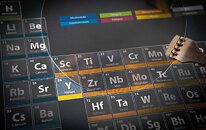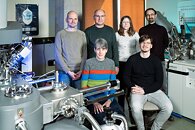- Joined
- May 21, 2024
- Messages
- 1,126 (3.52/day)
Researchers at Fraunhofer IAF have made a significant advance in semiconductor materials by successfully fabricating aluminum yttrium nitride (AlYN) using metal-organic chemical vapor deposition (MOCVD). AlYN, known for its outstanding properties and compatibility with gallium nitride (GaN), shows great potential for energy-efficient, high-frequency electronics. Previously, AlYN could only be deposited via magnetron sputtering, but this new method opens the door to diverse applications. Dr. Stefano Leone from Fraunhofer IAF highlights AlYN's ability to enhance performance while reducing energy consumption, making it vital for future electronics.
In 2023, the team achieved a 600 nm thick AlYN layer with a record 30% yttrium concentration. They have since developed AlYN/GaN heterostructures with high structural quality and promising electrical properties, particularly for high-frequency applications. These structures demonstrate optimal two-dimensional electron gas (2DEG) properties and are highly suitable for high electron mobility transistors (HEMTs).



Moreover, AlYN's ferroelectric properties make it ideal for non-volatile memory applications, potentially revolutionizing energy-efficient data storage, especially in AI-driven data centers. However, a major challenge remains: AlYN's susceptibility to oxidation, which researchers aim to mitigate through protective strategies and innovative manufacturing techniques.
View at TechPowerUp Main Site | Source
In 2023, the team achieved a 600 nm thick AlYN layer with a record 30% yttrium concentration. They have since developed AlYN/GaN heterostructures with high structural quality and promising electrical properties, particularly for high-frequency applications. These structures demonstrate optimal two-dimensional electron gas (2DEG) properties and are highly suitable for high electron mobility transistors (HEMTs).



"Our research represents a milestone in the development of new semiconductor structures. AlYN is a material that enables increased performance while minimizing energy consumption, paving the way for innovations in electronics that our digitally connected society and its ever-increasing technology demands urgently need," says Dr. Stefano Leone, scientist at Fraunhofer IAF.
Moreover, AlYN's ferroelectric properties make it ideal for non-volatile memory applications, potentially revolutionizing energy-efficient data storage, especially in AI-driven data centers. However, a major challenge remains: AlYN's susceptibility to oxidation, which researchers aim to mitigate through protective strategies and innovative manufacturing techniques.
View at TechPowerUp Main Site | Source


